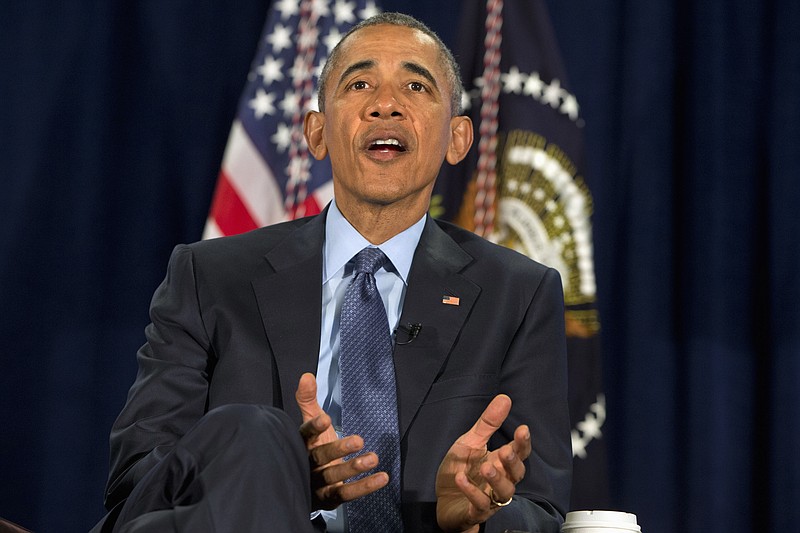Though the chummy Washington, D.C., media to which President Barack Obama was speaking last week probably just nodded their heads in assent, many heads outside the Beltway shook in derision at the president's remarks about the need for a "well-informed electorate."
"A job well done is to probe and to question, and to dig deeper, and to demand more," he said at the ceremony for the presentation of the Toner Prize for Excellence in Political Reporting. "The electorate would be better served if that happened."
Ironic, isn't it?
One of the reasons Obama is president of the United States is because the media didn't do what he called for in his speech the other day. It didn't probe or question or dig deeper about him, or if it did it kept everything to itself, knowing if it was revealed his campaign was toast.
His early associations with communist Frank Marshall Davis and terrorists Bill Ayers and Bernardine Dohrn barely registered in the 2008 presidential campaign. His adoption of Saul Alinsky's "Rules for Radicals" as his guide as a community organizer, and his years at the feet of America-damning pastor Jeremiah Wright were lost in the media's obsession in justifying him as a Christian (and not a Muslim, as some claimed).
When Obama was elected to the Illinois Senate in 1996, fellow legislators have said the hope was he might become a member of the reform-minded caucus, "the intellectual bridge, the pragmatic Democrat from Chicago we could perhaps talk to about broad-based consensus policies to change public policy that wasn't working." Instead, they said he decided he didn't want "to upset the apple cart with the Chicago machine."
Ultimately, he became just a back-bencher in the Illinois legislature - voting present nearly 130 times (therefore not casting "yes" or "no" votes), more than anyone else at the time in the state Senate - but did manage to register strong support for partial-birth abortions.
Meanwhile, his 12-year tenure as a law lecturer at the University of Chicago Law School, where he was described by Time magazine in 2008 as "a rock-star professor with hordes of devoted students," was not quite so. He was popular his first two years, an investigation by the Washington Examiner showed, but fell off sharply thereafter.
Obama often describes himself during his time there as a "constitutional law professor," but he never taught constitutional law and was never a professor. His colleagues say he was disengaged, did only what was minimally required, did not author an article in a single legal journal, and did not participate in faculty activities.
Finally, in the U.S. Senate, from January 2005 to October 2008, he missed 24 percent (314 of 1,300) of recorded, or roll call, votes. The median miss rate at the time was 2.4 percent. As in the Illinois Senate, his tenure was inconsequential, with various publications and lists referring to him as a "rank-and-file Democrat," a reliable liberal and, in 2007, the most liberal senator.
The media, in the 2008 race, focused instead on Obama's promises of hope, change, unity, post-partisanship and a post-racial country, and his potential status as the nation's first black president.
When he said, "I am absolutely certain that generations from now we will be able to look back and tell our children that this was the moment when the rise of the oceans began to slow and our planet began to heal; this was the moment when we ended war ," they bought it and sold it to listeners, viewers and readers.
Cut to Obama's speech last week, when his speechwriters gave him the proper words to say about what the role of the media should be, not what it was during the campaign to elect him and throughout his presidency.
"Journalism at its best is indispensable - not in some abstract sense of nobility," he said, "but in the very concrete sense that real people depend on you to uncover the truth. Real people depend on getting information they can trust because they are giving over decision-making that has a profound effect on their lives to a bunch of people who are pretty remote."
The words are nice, but the reality for this president is different. In a 2015 Politico poll, 65 percent of White House correspondents said Obama is the least press-friendly president they've ever seen, 78 percent believe he dislikes the press and five times more reporters believe he is becoming less and less open with the press than believe he's getting more transparent with time.
Could the same thing be happening this year? In all likelihood, it is.
While Republicans Donald Trump and Sen. Ted Cruz have created their own circus from which the media can't turn away, the most ethically challenged Democrat in years is the front-runner for her party's nomination. But when did the media last "dig deeper" and "demand more" from Hillary Clinton's campaign?
So, it would be gratifying if the media took Obama's words to heart, but it would be even better if the candidates on both sides didn't merit so much probing.
